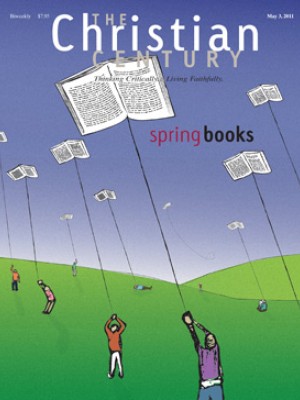Spring for books
Martin Marty laments the moment when you realize you are not going to read all the books you hoped and planned to read—and you will have to depend on what others are saying about books you will not get around to reading.
The shelf where I place books I intend to read is so full it makes me nervous just to look at it. And then along comes a book that makes you put aside what you are reading. The book that did that recently for me is Unbroken, by Laura Hillenbrand. It is the compelling story of Louie Zamperini, an Olympic distance runner and bombardier on an Army Air Corps bomber who was shot down over the Pacific in 1943. He survived months on a raft and then endured a series of hellish POW camps. In postwar Los Angeles, he became depressed and took to drink but found redemption—and learned forgiveness—after attending a Billy Graham revival. Unbroken wreaked havoc on my Lenten reading.
Long before I began to work for the Christian Century I relied on it to help me decide which books to buy on my limited budget. On the basis of this spring books issue, I will be picking up Walter Brueggemann's Disruptive Grace, Richard Crouter's book on Reinhold Niebuhr and probably Terry Eagleton's Why Marx Was Right. (I found his Reason, Faith, and Revolution to be engaging and funny but so overstated that I became irritated.)
Read our latest issue or browse back issues.
I am grateful to learn about Warren Farha and his Eighth Day Books, a "theologically oriented" bookstore (see "Books of consequence"). I was fascinated to learn how he got into the business and how his store is making it in an unusually difficult time for booksellers.
I love bookstores almost as much as I love major league ball parks. When I arrived in Chicago for study I was directed to a legendary bookseller on 57th Street who was belligerent and outspoken and treated customers as unwelcome interruptions to his own reading. "I'm looking for The Nature and Destiny of Man, by Reinhold Niebuhr," I once inquired. "Why the hell do you want to read that crap?" was his response. When I returned to Chicago 25 years ago I was delighted to discover half a dozen or so bookstores within easy walking distance of the church: Kroch's and Brentano's, Crown, B. Dalton and Stuart Brent.
There were books in my home when I was growing up. My parents read and urged me to read. My grandfather, who owned books that he never read, taught me how to open a book properly to preserve the binding. I still have his full set of the works of Dickens, every volume unopened.
I am being urged by my friends, children and grandchildren to buy a Kindle or a similar such electronic device. "It is so easy," I am told. I know that's true and I suppose I will eventually own one. But for now I love the feel of a book in my hand, the heft and smell of it, the marginalia, the pages of notes I keep in the back.
In Due Considerations, the late John Updike explained his own love affair with books, an affair that intensified because of their endangerment:
Shelved rows of books warm and brighten the starkest room . . . By bedside and easy chair, books promise a cozy, swift, and silent release from this world into another . . . Smaller than a breadbox, bigger than a TV remote, the average book fits into the human hand with a seductive nestling, a kiss of texture . . . How many divorces have been forestalled by love of the same jointly acquired library? Books hold our beams down; they act as counterweight to our fickle and flighty natures.






